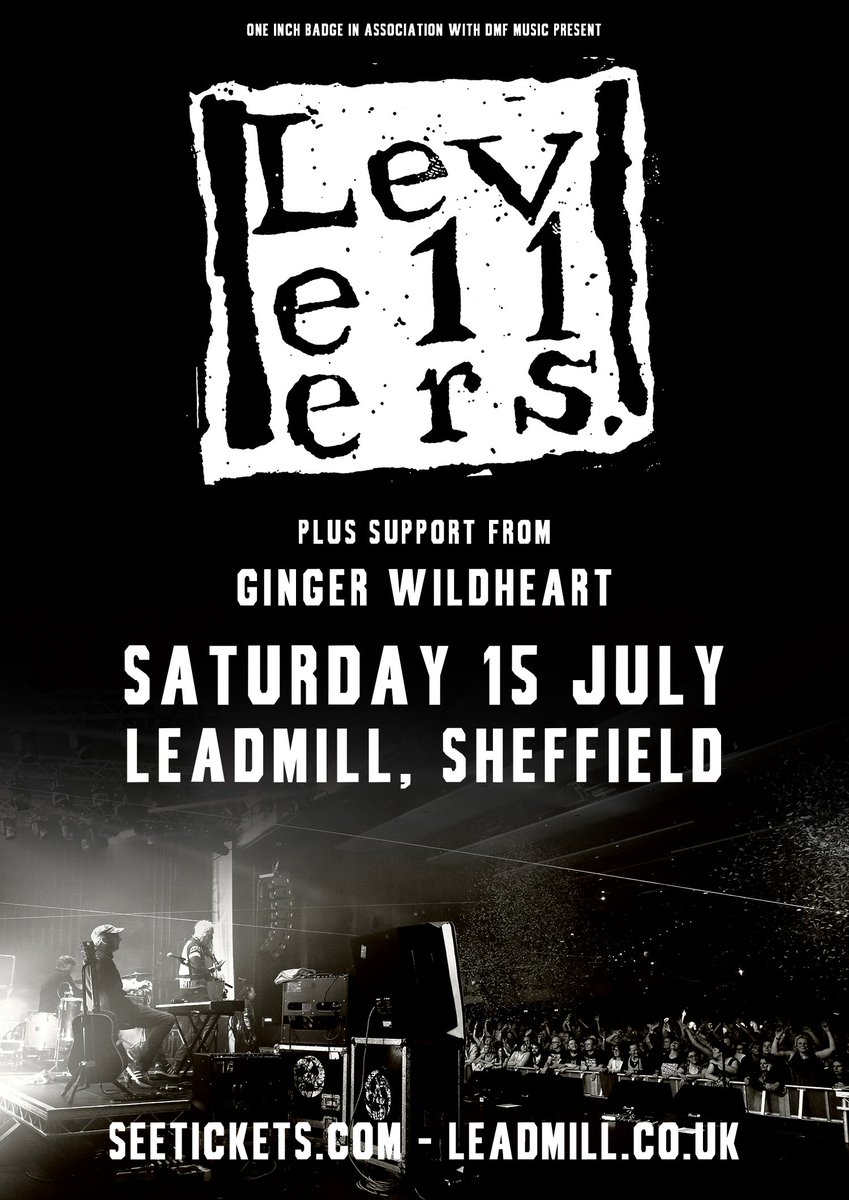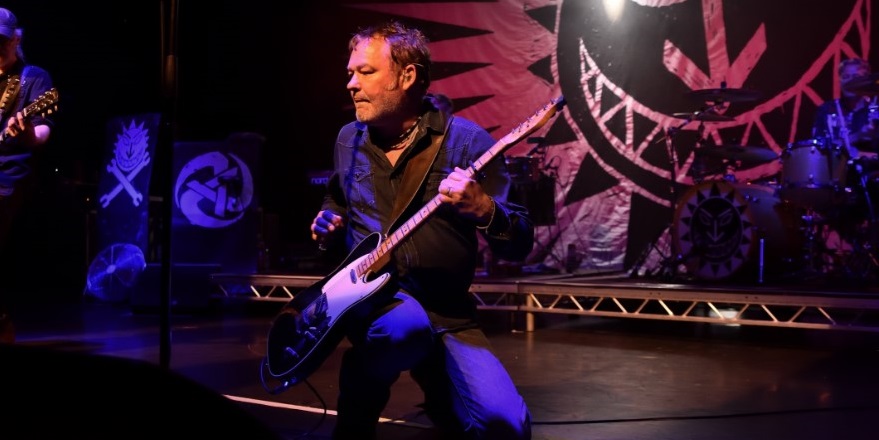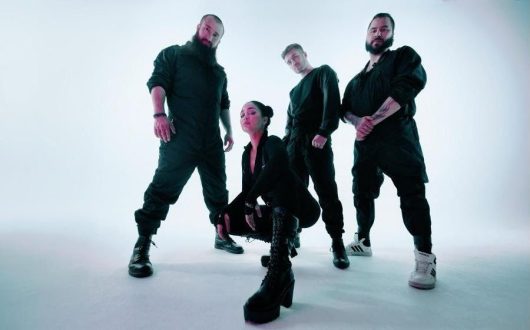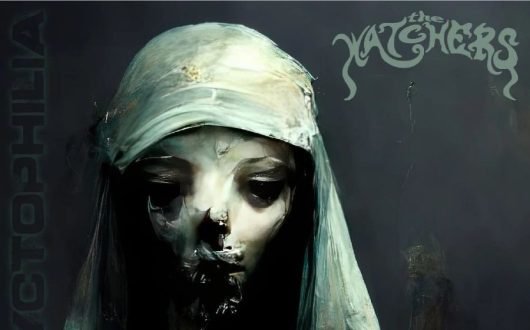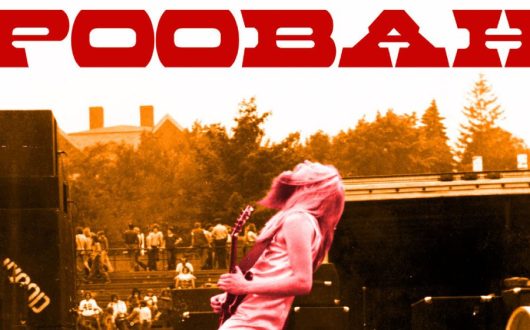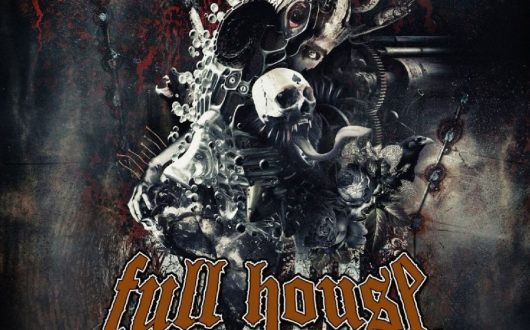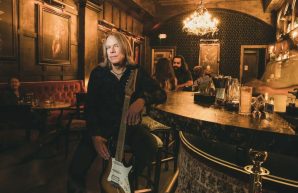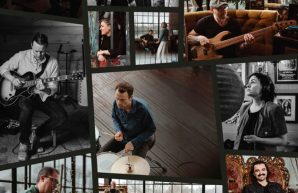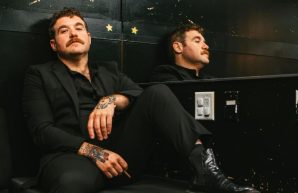Interview with Levellers front man Mark Chadwick by Adrian Hextall
After an acrimonious split with Musidisc, their first record label, the Levellers were discovered by Derek Green and signed to China Records, the move that saw them release the seminal ‘Levelling The Land’, an album that catapulted the band into the minds of the public and drew scathing critical responses from some in the popular music press.
As is often the case, the public ignored the press who always thought they knew best and copies of the album flew off the shelves, entering the charts at number 14. The anthemic single “One Way”, has become the band’s signature song over the years and along with punk-rock tracks “Liberty Song” and “Battle of the Beanfield”, folk ballads “The Boatman” and “The Road”, and folk-rock crossover tracks like “The Riverflow” and “Another Man’s Cause” the album is currently being toured as part of a 25th Anniversary show to packed theatres.
Recalling their times playing at Glastonbury in 1992 and 1994 and the frank documentary chronicalling the evolution of the band, Adrian Hextall spoke to lead vocalist Mark Chadwick.
AH: Looking back at the history of the band, the early 1990s saw you play the ANL [Anti Nazi League] concert against the BNP at Brockwell Park, London. You played with the Manic Street Preachers and Credit To The Nation.
MC: It was insane.
AH: It was a quite powerful day, wasn’t it?
MC: Do you know what? It was weird, It was massively attended. I think there were at least 80,000 people in there. I was like – my God, literally I’ve never seen that many people in one space. To this day I haven’t.
AH: And how peaceful was it as well.
MC: It was great.
AH: It was so friendly an atmosphere wasn’t it.
MC: Really great, and like Rock Against Racism organised it ‘just’. Back in the day you could do shit like that, there was no health and safety issues. It was good.
AH: It was a powerful message and a good reason to attend. Coming off that, what motivates you now?
MC: The same shit. [laughter] It’s worse. So our viability is undiluted. It’s just you know, you know what you do. It’s a state of civil war right now. And you know I look at people I go [f…k] Brexit’s here [f..k] Tory, you know I think that I mean you should see my life. I used to know who the enemy was. Now I’m not as sure. you know what I mean?
I think that’s healthy for a country to be in the state that is brought about by idiot politicians particularly Tory idiot politicians. Always after self interest anyway have led us down this garden path to what I consider to be ultimately [f..k] tedious. It’s not just a disaster its tedious.
AH: Because it doesn’t change, does it?
MC: No it’s just tedious. And I think it’s not promoting anything positive there’s no positives in it. And that the level is always about the positive, that’s what we do. So that gives us our agenda it’s going to be positive. And that’s why we still do well. But yeah, [laughter]
AH: Does it fuel your creativity when it comes to writing songs?
MC: Do you know it kind of doesn’t? We kind of wrote about it already. Nothing’s really changed, I can’t rephrase the same songs in the same way. I cant rewrite a song that’s already be written. So in a way it’s actually quite smothering. Not that it’s going to stop us, but although things haven’t changed we wouldn’t repeat ourselves and there’s one thing we never want to do.
AH: I can understand that.
MC: So in fact yeah, there’s always a story out there. Don’t worry about that. We can’t stop writing, this is a good thing.
AH: Tell us a little bit about the recent documentary that Dunstan Bruce of Chumbawamba put together.
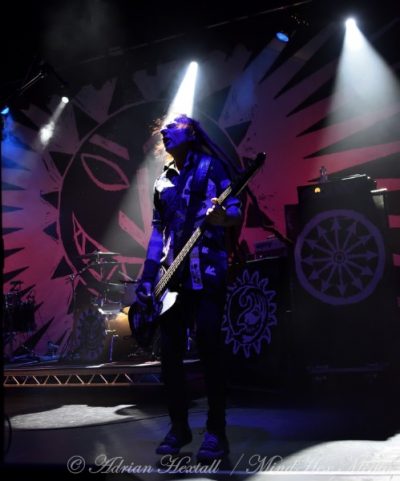 Documentary ‘A Curious Life’ which is a film about the Levellers’ rise to fame in the 1990’s premiered in June 2014. Told through the unique perspective of Jeremy Cunningham, the band’s bass player and artist, and directed by former Chumbawamba frontman Dunstan Bruce, the film focuses on the Levellers phenomenal success between 1988 and 1998.
Documentary ‘A Curious Life’ which is a film about the Levellers’ rise to fame in the 1990’s premiered in June 2014. Told through the unique perspective of Jeremy Cunningham, the band’s bass player and artist, and directed by former Chumbawamba frontman Dunstan Bruce, the film focuses on the Levellers phenomenal success between 1988 and 1998.
MC: We wanted to make a film. But we did not want to make a film in the traditional sense of a documentary without a band. Because they are pretty dull. There are narratives like tour narratives, how the band got together at the beginning and then they do the X and X and X and X and its boring. And so we’ve got Dunstan to record and cut the film together. And of course we had to find the old film footage.
Part of the documentary ‘A Curious Life’ saw the band in a warehouse crawling into tight roof spaces looking for film footage from their triumphant shows at Glastonbury Festival in the early 1990s.
AH: Watching you climb over the top of the boxes in that warehouse trying to find those video tapes. Fancy them still being there…unbelievable.
MC: I know. But yeah for Dunstan, he had to find the film within what he’d filmed to make it an interesting narrative and he found Jeremy. He found Jeremy and he’s found Jeremy’s parents and he thought this is interesting, this is a viewpoint of a band that most people wouldn’t ever expect or see.
Sheila and Brian [Jeremy’ Cunningham’s parent] are just funny people. And we also lok to Jeremy’s viewpoint and he’s just dysfunctional totally. We thought the story through him might be an inspiration to some people. It won’t put other people off.
AH: Was it wholly down to him [Jeremy] that all of your archive material has survived?
MC: He is an archivist. He is a historian as well. Jeremy is an interesting character. He’s like you don’t really make that many characters in this world. So Jeremy’s a real one. We decided to focus on the bass player rather than me or Simon [Friend, guitar].
AH: Which is as you say would be your typical documentary wouldn’t’ it?
MC: Jeremy’s story is much more interesting I think.
AH: Your segments for example. Just sat there casually in the pub. They’re just neat segues into the ongoing story of Jeremy. It felt so relaxed.
MC: Well it was. Dunston wasn’t it. Duncan’s his real name by the way. He’s a little bit funny. He’s really funny, very very very bright man.
AH: Of course one of the things on that documentary is the recollections of the first Glastonbury appearance and of course when you then went back 2 years later and did it all over again. Comparing how it was then, even as it was then when you were playing it was a different Glastonbury than the way it had been in years before with all the travellers. If you compare how it is now, it’s different again. Do you think you’ll ever go back I mean it seems unlikely?
MC: I don’t think we will.
AH: It doesn’t feel like the Glastonbury from when you were playing.
MC: I don’t think we will. We’re not particularly anxious to do it, its not important enough to do it.
As an aside, you know it’s BBC all of Portland place goes to the Glastonbury for three days. Even the accountants you know they all go. You’re not stuck at the BBC for it but its like it is literally, its kind of weird. It’s given a media-vibet they’ve commercialised it beyond all recognition to it so therefore I have, I respect it for want it is. Trust me, its the biggest festival in the world. Can’t fault that. You can’t fault that.
AH: No I mean as a success story it’s fantastic, isn’t it?
MC: Yeah absolutely. But I don’t know if we’ll ever play again. Never say never but I don’t think so .
AH: But you’ve got to be comfortable with what you guys are doing on Beautiful Days?
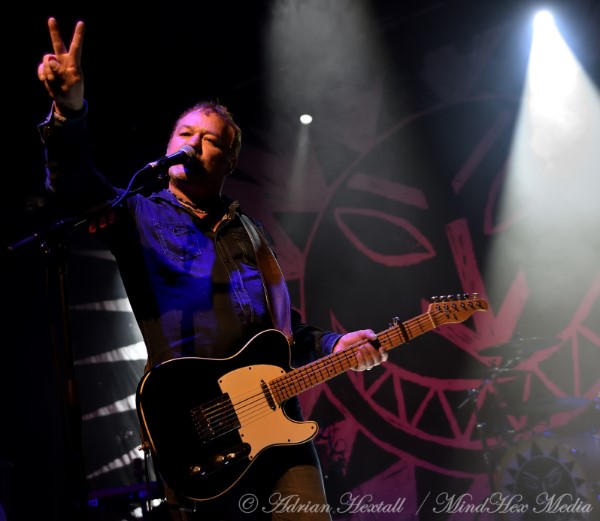
MC: We are very comfortable in our own skin about who we are and what we are. We don’t really need to compromise at this point. It would be stupid to do so. I think playing Glastonbury is, I’m sorry the fact that the people that buy the tickets buy them all within the minute.
AH: Without knowing who is playing?
MC: Without knowing who’s playing or don’t care. These are media savvy, [f..k] tech savvy people from London who can afford it. And it ain’t the people. We are about the people.
AH: They are not the fans you want to see, they are not actually your fans, are they?
MC: No, really wouldn’t be.
AH: Just jumping back into the DVD again. The live shows that you did with the screenings as well. So we got the screening of the documentary then you guys did those wonderful acoustic shows. They were special. Was that,a conscious decision to pair the two together or did someone just say why don’t we do this?
MC: No , no it was a conscious decision what it was, created the film then played it, we wanted to be there. And we did it all over Europe as well and it was good.
AH: Good reception I would imagine.
MC: Yeah, yeah, no great that’s really great. Because its like people get to understand us more – about who and what we are. And then seeing it is like “aaaaaah” for some people the penny really dropped.
AH: You mentioned you’re playing the album [Levelling the Land] tonight. Is it a tough one? To balance it with your desire to play to the new material as well?
MC: In a balanced world, we would play new material. We just recorded a new album its been mixed it’s fantastic. But we can’t play it because no one has heard any of it yet.
AH: But what about the old days when you go “here’s a new one for ya”?
MC: Yeah, do you know what…That stuff really is for the younger guys they have to work like that. Eventually they stop. Because you get worn out doing that. We did like seven or eight albums like that in quick succession and it does wear you out.
Now we put out new material when it’s good and ready. There is no one breathing down your necks going “put the record out put the record out.” You put the record out when its right.
MC: And we’ve just recorded the new one and mixed it and it’s brilliant. I think it’s the best record we’ve made. It does have some other songs on it, that you can play and you’ll recognise some as well.
AH: Wonderful. So reworkings of all the old ones.
MC: Reworkings of old ones and new ones and unexpected ones that people aren’t that familiar with.
AH: You settled on a title, or you yet to say or?
MC: We haven’t yet we’ve got to decide that this weekend actually. It’s likely to be out in the beginning of next year, March 18th.
AH: Looking at the period before “Letters from the Underground” and I’m now going back as far as say “Hello Pig”. Now you’d had that string of albums that put you on Top of the Pops [BBC TV] on a regular basis, you were really riding the crest of a wave. What changed with the dynamic after “Zeitgeist” came out. Because something was different when you had that follow up album.
MC: I’ll tell you what happened. What happened was we had a pig. [Laughs] No, what happened was our record company which was independent record label bought out by Warner’s, who are as you know a global enterprise.
The entire Warner, this [f..k] big company and they killed off our record company. Slaughtered them basically. Absolutely brought them to the wall. Now so they slaughtered them. And then they put our MD of the record out of a job gave them a little office in the corner of the room. A desk in the corner and all that. And we were contracted and they bought the contract that we signed with China [Records] so we had to obligate it. So we thought about this, lets make a record we want to make.
Yeah we went and made a drug record. A real headphone record. It was an album that you couldn’t go to a gig and jump about to. This was a headphone record and it really pissed off Warners which was great as we wanted to do it so they would drop us. So we were able to go somewhere else.
Bizarrely in the music critics world, they loved it. They thought it was the best recording we had ever made. Those fans hated it. Well…
AH: It caught me at a crossroads. It was like ‘what am I supposed to do with this?’
MC: You were supposed to smoke a spliff whilst listening to it [Laughs].
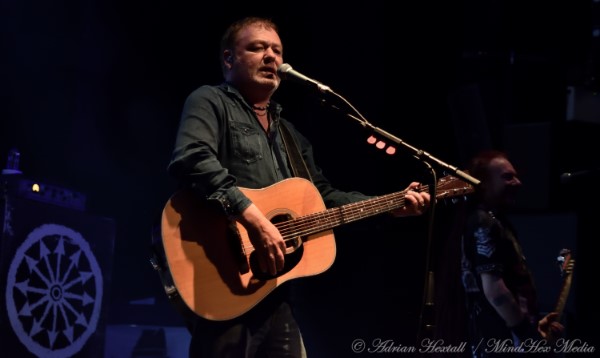
AH: Right I’ll bear that in mind. after that album you had patch in the wilderness. It took me a while to rediscover the band again but now, the last two albums, Letters and Static [on the Airwaves], you’ve found your direction again?
MC: Yeah its very much a transitional period, all bands have it. You know you exist for a long period of time which we have and after a certain number of years, shit is going to happen. [laughter] Shit’s going to happen you can’t always be in charge of your own trajectory. We would have been if Warners hadn’t brought China it would have been a very different history.
But that’s what happened. And we probably would have made the same record again. We needed to make it because it actually is a band that’s much more musical than people give us credit for. We think about what we do we don’t just go out with three chords and a violin and go “I hate tanks and I hate guns”. We don’t do that. There were many bands out there, that mimic the Levellers and that think that’s what we do and that’s what they do. But they are not listening to what we do. What we do is much more complicated than that.
AH: Yeah and I was going to say the influence is that the five of you have, either on different instruments anyway, that’s got to make a big difference to the song structures I would have thought.
MC: Absolutely. And the way we all think about things. Thing about the Levellers is that we are always on the same page. When times change we change with them and we will always agree about what’s going on.
AH: Yeah it is always a collective decision as to where
MC: We are collective the Levellers are always a collective.
AH: It always feels like that’s what we always have been to be fair.
MC: There’s no boss. There is no dictator in this band. Occasionally.
AH: Well presumably somebody needs to make the casting vote or something like that.
MC: Occasionally but generally as a consensus its really genuinely is the same we don’t have to worry about that any more. Just like I said we were always on the same page.
AH: You’ve got a gig in Sheffield coming up over there, haven’t you? You’ve got Ginger supporting you.
MC: Oh Ginger yeah.
AH: Yeah and that’s a nice mix because he’s got this new album which seems to fit perfectly with a Leveller’s gig.
MC: Yeah, it’s great. He’s really pleased to be doing this so that’s good.
AH: Yeah, are you, have you worked with him before?
MC: I’ve drank with him. [laughter] I can’t remember luckily I better not. We don’t tend to work with others that much. We’re old school we’re a rock and roll band. its what we are, we are a band. We get other people to do stuff occasionally, with Imelda May, Billy Bragg and various others and its been great. But Ginger hasn’t been in any of them.
He emailed us and said I’ll see you’re playing can we come and support you? We said yes immediately. Because The Wildhearts is one of my favourite bands, great band. That’s a proper rock and roll band.
Tickets for the Sheffield show and the rest of the tour can be purchased here:
